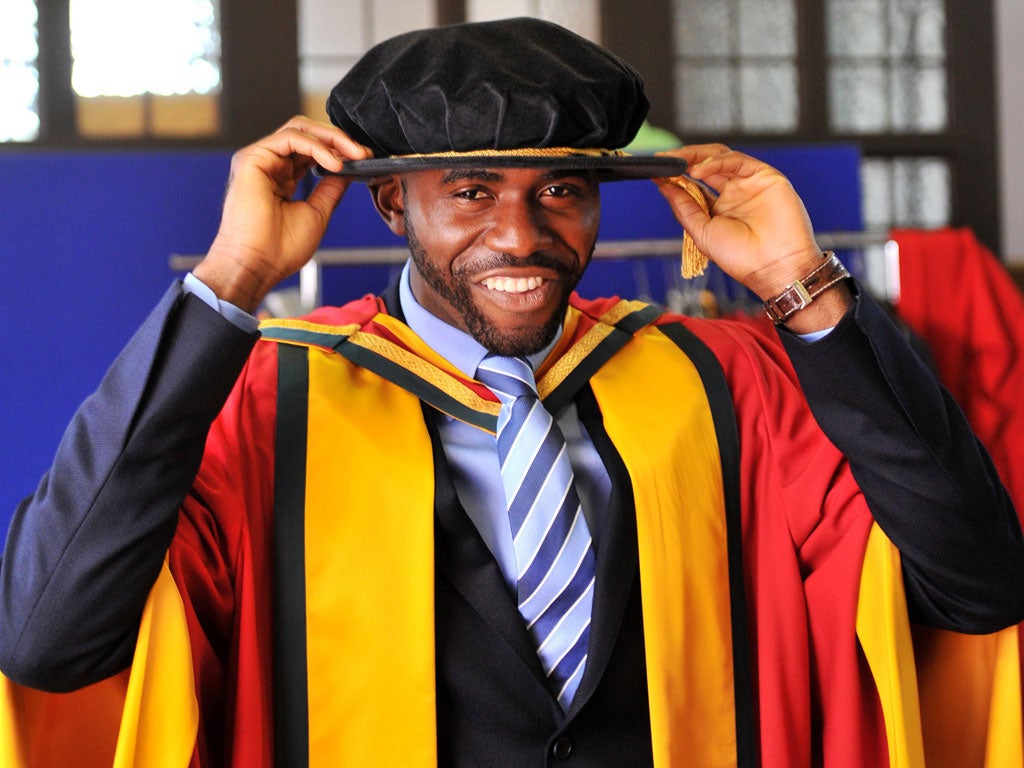The Last Word: It's not as simple as footballers bad, Olympians good...
For even Barton to share the distaste may seem to testify to its substance

The firework smoke has drifted from the Olympic city, borne upon the fading hum of geriatric rock music. And, in its wake, a new clarity. All of a sudden, the advent of a new football season is being depicted as some barbaric congress of serpents in our rediscovered Eden.
Late summer always contains a poignant quality. That moment when you realise you haven't heard a swift for a few days. The ruthless shearing of fields. As a rule, the return of football is one of the few things calculated to soften any incipient despondency. This time round, however, it seems to be having the reverse effect on those intoxicated by the Olympics. As hangover cures go, they would sooner wait for a hair of the dog in the Paralympics.
Now it is difficult to disagree that the half-time barracking of the referee at Villa Park last Sunday – in the "Community" Shield, of all things – provided an abrupt and nauseating change in timbre. Immediately before the Games, a mortifying court case had amplified the vileness that passes for "banter" on the field. But none of that warrants a consensus that the modern footballer is necessarily a symbol of poisonous decadence.
This week, one of the Premier League's pantomime villains challenged its culture after himself becoming immersed in Olympic euphoria. Joey Barton, in his blog, evoked the despair familiar to all football fans, immediately after a World Cup or European Championship, and admitted that he grieved the end of the Olympics more than that of any recent tournament.
Barton implored football to retrieve its historic role as the people's game, "crossing all boundaries, like the Olympics". Those covering the sport could play their part, by renouncing negativity. But football itself needed new humility. Players – himself included – needed to connect better with the fans; to emulate the engagement of Bolt, the gratitude of Farah. It was in turning on club owners, however, that Barton mounted a real chariot of fire. Their money, enterprise and professionalism were welcome, but not their exploitation of a communal heritage established over generations. "Clubs bleat about the fans needing to support them, to buy the tickets and more merch," Barton wrote. "Yet so often treat the fans with … disdain, as though they're cattle to be herded. In short they act like big consumer brands. A road to ruin, surely?"
Now this is hardly the first evidence of paradoxical cerebration in a man who reached a fresh nadir, sent off in disgrace, during the very climax that deceived the Premier League it had achieved new invulnerability in the affection of the masses. For even Barton to share this distaste for his own sport might seem to testify to its substance. At the same time, however, it stands to reason that many of his peers, having never shared Barton's heedless, headless invitations to opprobrium, may also be less conspicuous in a quiet acuity of their own.
Countless professionals embrace their fortune with dignity and responsibility; many undertake community or charity work with a due sense of the obligations that accompany their privilege. To tar them all with one brush, on account of a repellent minority, is fatuous and insulting.
It was also this week, after all, that Fabrice Muamba reluctantly accepted he had pushed his luck as far as was prudent simply in surviving that harrowing episode at White Hart Lane in March. Those now lining up to vilify his peers must state whether Muamba's distress, in reconciling himself to retirement at 24, owes anything to his status as another avaricious mercenary? Or do they acknowledge him as an exemplary professional, a bright and engaging young man, whose hunger and energy on the field reflected his joy in the skill and character that together redeemed him from the tribulations of his boyhood? Fleeing a murderous civil war, Muamba arrived here at 11 without a word of English but has since achieved academic distinction and a stable, devout family life.
Barton, equally, is a more complex creature than most surmise. To caricature all footballers in coarse brushstrokes is as foolish as to claim that all 10,000 athletes who assembled for the Olympics are paragons of virtue. People have short memories. Infatuated by the Olympics, they have quickly forgotten the edifying lessons of Muamba's crisis – that the football community is rich in more ways than one.
You can't have it both ways. You can't agree that the splendid Muamba deserves universal sympathy and the chance of a fulfilling new career, ideally in the environment he adores; and then, in the same breath, disparage all his ilk as arrogant, spoiled knaves. Beyond discouraging appearances, no less than Muamba when his heart stopped, the best of the game lives on.
Subscribe to Independent Premium to bookmark this article
Want to bookmark your favourite articles and stories to read or reference later? Start your Independent Premium subscription today.

Join our commenting forum
Join thought-provoking conversations, follow other Independent readers and see their replies